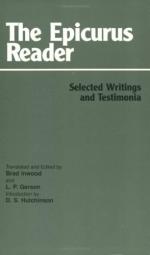|
This section contains 4,730 words (approx. 16 pages at 300 words per page) |

|
Epicurus was born on Samos to parents who were Athenian citizens. Evidence about his philosophical debts and development must be sifted from conflicting reports arising out of the agonistic context of ancient Greek philosophical rivalry and invective. While rivals charge him with merely plagiarizing his atomism from Democritus and hedonism from the Cyrenaics, his advocates praise his singular originality, probably encouraged in this by Epicurus himself. Like Parmenides, René Descartes, and other seminal figures in philosophy, Epicurus presented himself as a solitary herald of truth, creating his system de novo because of the inadequacy of his predecessors and teachers. Modern scholarship tends to split the difference, seeing a variety of possible influences—Democritean atomism, Cyrenaic hedonism, Aristotelian eudaimonism, skeptic impeturbablilty—while fully recognizing that however much Epicurus worked within an existing framework, he is responsible for a succession of remarkably influential innovations.
Life and Sources
|
This section contains 4,730 words (approx. 16 pages at 300 words per page) |

|


